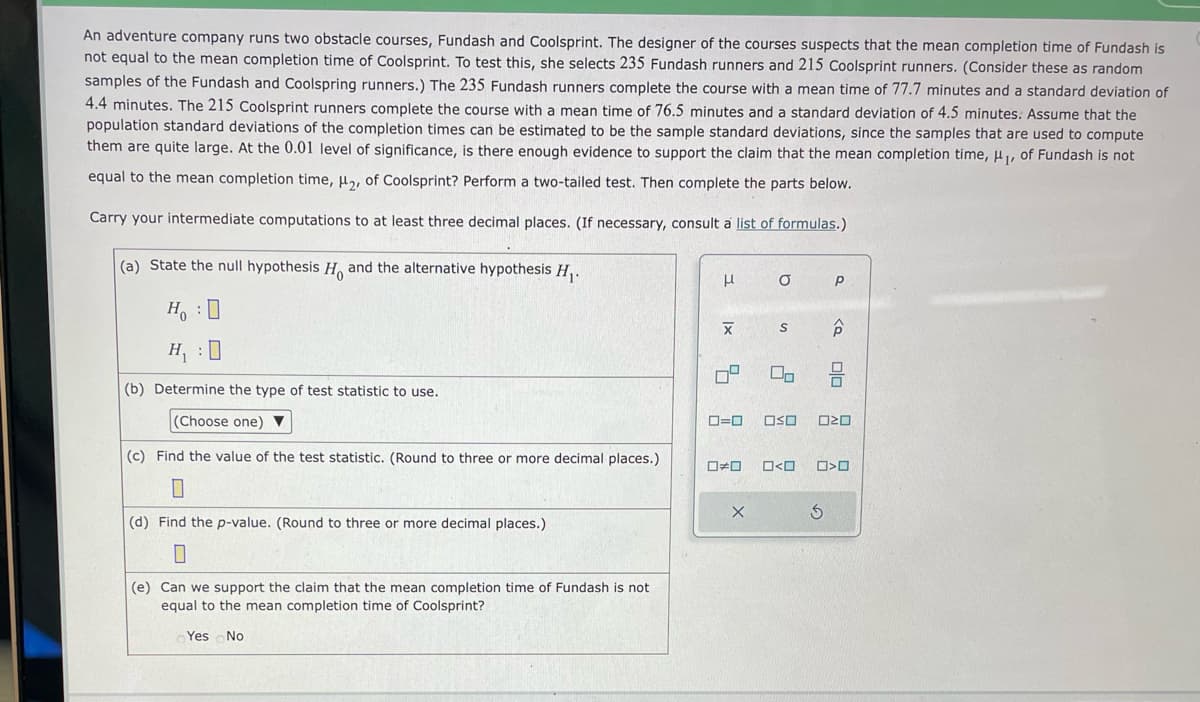An adventure company runs two obstacle courses, Fundash and Coolsprint. The designer of the courses suspects that the mean completion time of Funda: not equal to the mean completion time of Coolsprint. To test this, she selects 235 Fundash runners and 215 Coolsprint runners. (Consider these as random samples of the Fundash and Coolspring runners.) The 235 Fundash runners complete the course with a mean time of 77.7 minutes and a standard deviati 4.4 minutes. The 215 Coolsprint runners complete the course with a mean time of 76.5 minutes and a standard deviation of 4.5 minutes: Assume that the population standard deviations of the completion times can be estimated to be the sample standard deviations, since the samples that are used to comput them are quite large. At the 0.01 level of significance, is there enough evidence to support the claim that the mean completion time, H₁, of Fundash is not equal to the mean completion time, μ₂, of Coolsprint? Perform a two-tailed test. Then complete the parts below. Carry your intermediate computations to at least three decimal places. (If necessary, consult a list of formulas.) (a) State the null hypothesis H and the alternative hypothesis H₁. HD H₁ :0 (b) Determine the type of test statistic to use. (Choose one) ▼ (c) Find the value of the test statistic. (Round to three or more decimal places.) 0 (d) Find the p-value. (Round to three or more decimal places.) 0 (e) Can we support the claim that the mean completion time of Fundash is not equal to the mean completion time of Coolsprint? Yes No H |x ロ=ロ 00 X O S 2 00 0<0 P
An adventure company runs two obstacle courses, Fundash and Coolsprint. The designer of the courses suspects that the mean completion time of Funda: not equal to the mean completion time of Coolsprint. To test this, she selects 235 Fundash runners and 215 Coolsprint runners. (Consider these as random samples of the Fundash and Coolspring runners.) The 235 Fundash runners complete the course with a mean time of 77.7 minutes and a standard deviati 4.4 minutes. The 215 Coolsprint runners complete the course with a mean time of 76.5 minutes and a standard deviation of 4.5 minutes: Assume that the population standard deviations of the completion times can be estimated to be the sample standard deviations, since the samples that are used to comput them are quite large. At the 0.01 level of significance, is there enough evidence to support the claim that the mean completion time, H₁, of Fundash is not equal to the mean completion time, μ₂, of Coolsprint? Perform a two-tailed test. Then complete the parts below. Carry your intermediate computations to at least three decimal places. (If necessary, consult a list of formulas.) (a) State the null hypothesis H and the alternative hypothesis H₁. HD H₁ :0 (b) Determine the type of test statistic to use. (Choose one) ▼ (c) Find the value of the test statistic. (Round to three or more decimal places.) 0 (d) Find the p-value. (Round to three or more decimal places.) 0 (e) Can we support the claim that the mean completion time of Fundash is not equal to the mean completion time of Coolsprint? Yes No H |x ロ=ロ 00 X O S 2 00 0<0 P
Glencoe Algebra 1, Student Edition, 9780079039897, 0079039898, 2018
18th Edition
ISBN:9780079039897
Author:Carter
Publisher:Carter
Chapter10: Statistics
Section10.6: Summarizing Categorical Data
Problem 10CYU
Related questions
Question

Transcribed Image Text:An adventure company runs two obstacle courses, Fundash and Coolsprint. The designer of the courses suspects that the mean completion time of Fundash is
not equal to the mean completion time of Coolsprint. To test this, she selects 235 Fundash runners and 215 Coolsprint runners. (Consider these as random
samples of the Fundash and Coolspring runners.) The 235 Fundash runners complete the course with a mean time of 77.7 minutes and a standard deviation of
4.4 minutes. The 215 Coolsprint runners complete the course with a mean time of 76.5 minutes and a standard deviation of 4.5 minutes. Assume that the
population standard deviations of the completion times can be estimated to be the sample standard deviations, since the samples that are used to compute
them are quite large. At the 0.01 level of significance, is there enough evidence to support the claim that the mean completion time, H₁, of Fundash is not
equal to the mean completion time, H₂, of Coolsprint? Perform a two-tailed test. Then complete the parts below.
Carry your intermediate computations to at least three decimal places. (If necessary, consult a list of formulas.)
(a) State the null hypothesis H, and the alternative hypothesis H₁.
HO
H₁ :0
(b) Determine the type of test statistic to use.
(Choose one) ▼
(c) Find the value of the test statistic. (Round to three or more decimal places.)
0
(d) Find the p-value. (Round to three or more decimal places.)
0
(e) Can we support the claim that the mean completion time of Fundash is not
equal to the mean completion time of Coolsprint?
Yes No
3
|x
X
0#0
a
X
S
ロ=ロ OSO
On
0<0
Р
3
<Q
DO
20
O<O
Expert Solution
This question has been solved!
Explore an expertly crafted, step-by-step solution for a thorough understanding of key concepts.
Step by step
Solved in 3 steps with 3 images

Recommended textbooks for you

Glencoe Algebra 1, Student Edition, 9780079039897…
Algebra
ISBN:
9780079039897
Author:
Carter
Publisher:
McGraw Hill

Holt Mcdougal Larson Pre-algebra: Student Edition…
Algebra
ISBN:
9780547587776
Author:
HOLT MCDOUGAL
Publisher:
HOLT MCDOUGAL

Glencoe Algebra 1, Student Edition, 9780079039897…
Algebra
ISBN:
9780079039897
Author:
Carter
Publisher:
McGraw Hill

Holt Mcdougal Larson Pre-algebra: Student Edition…
Algebra
ISBN:
9780547587776
Author:
HOLT MCDOUGAL
Publisher:
HOLT MCDOUGAL